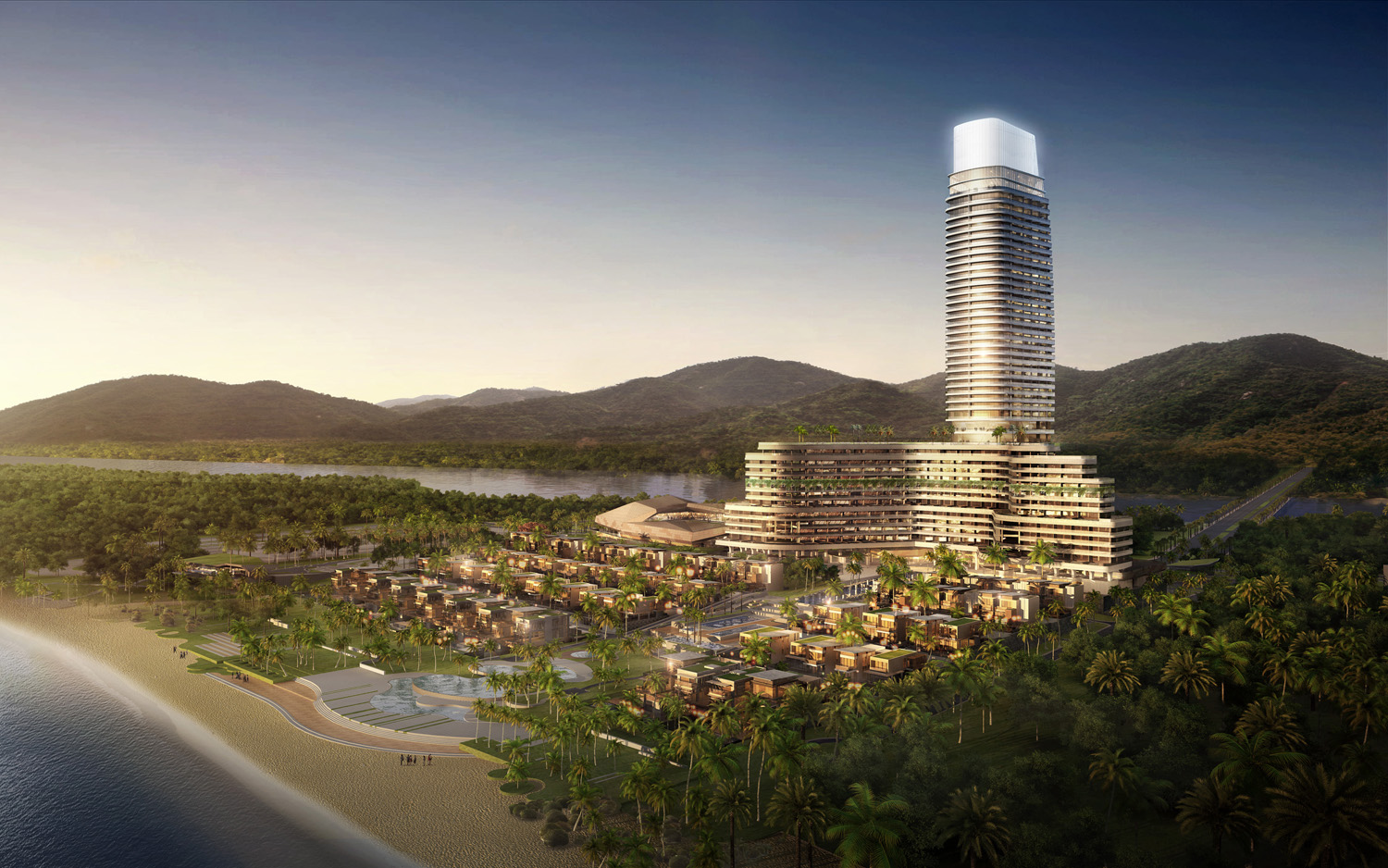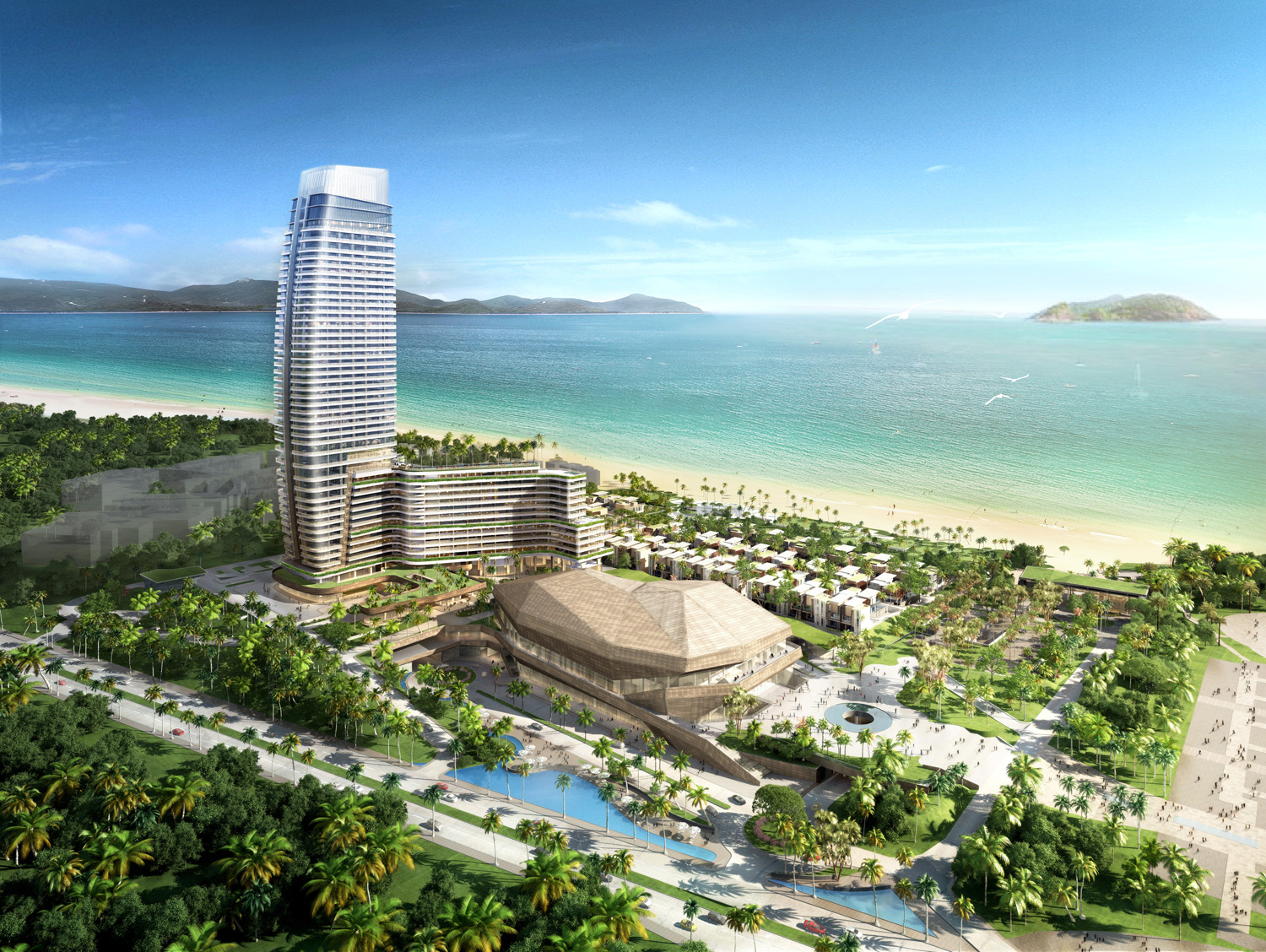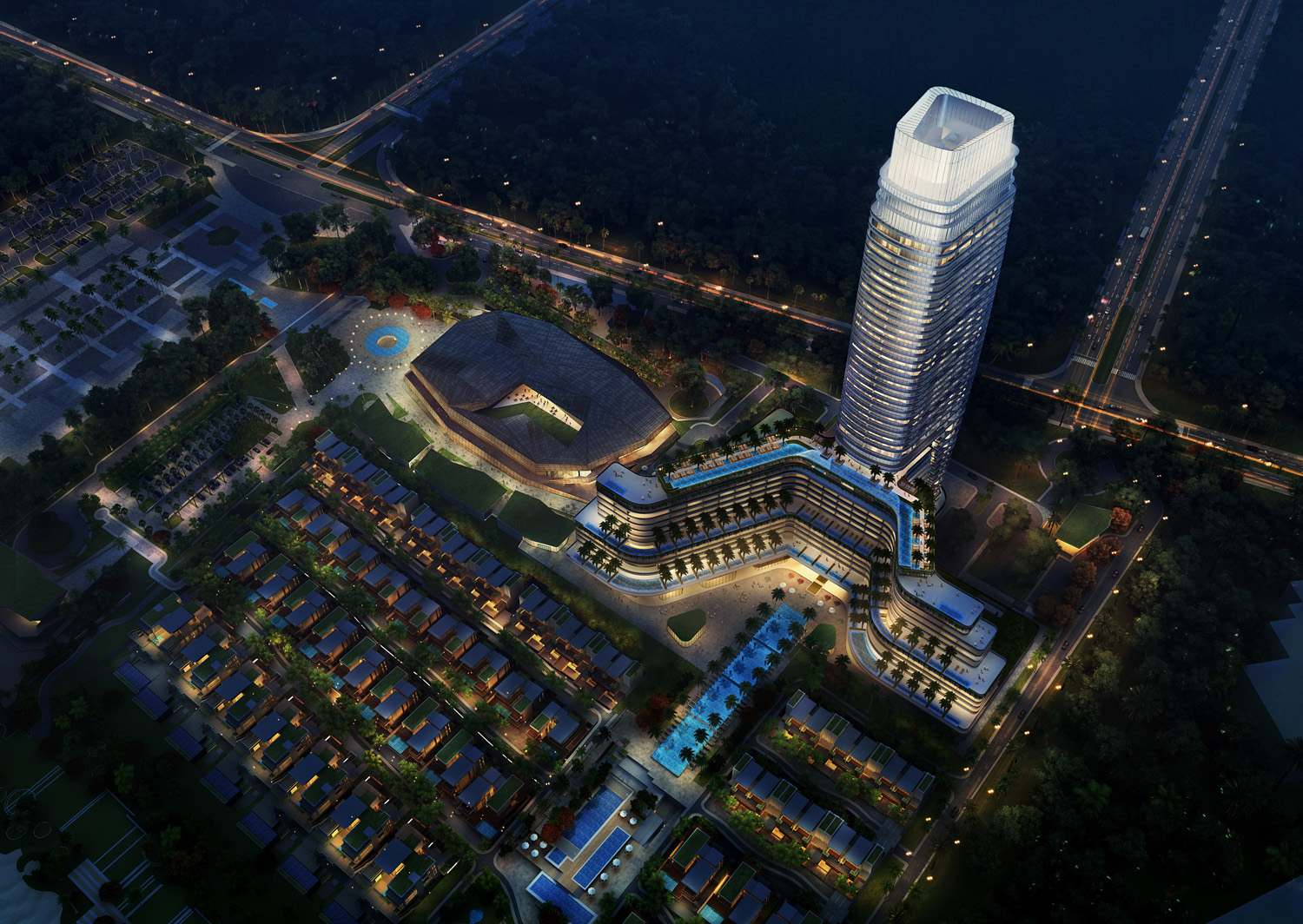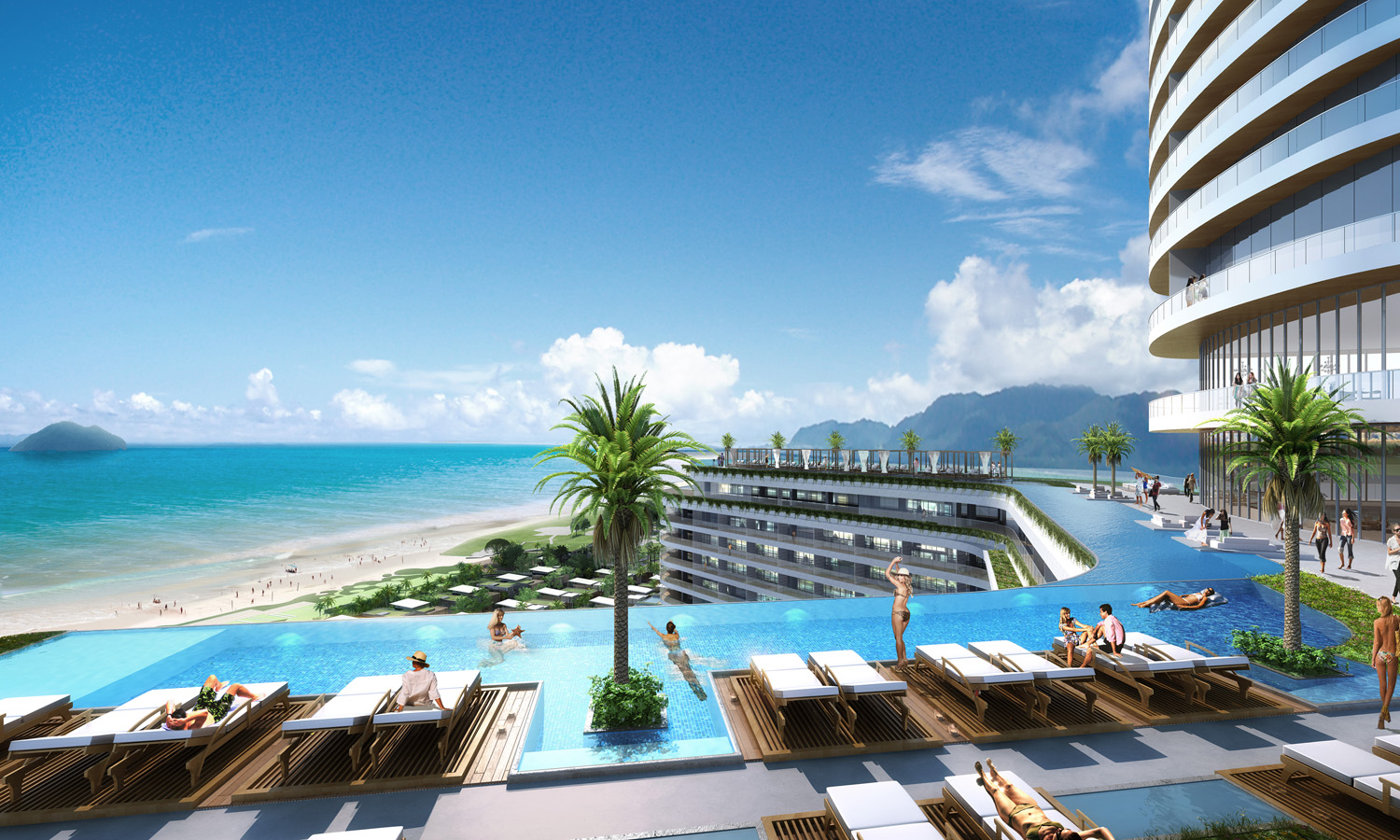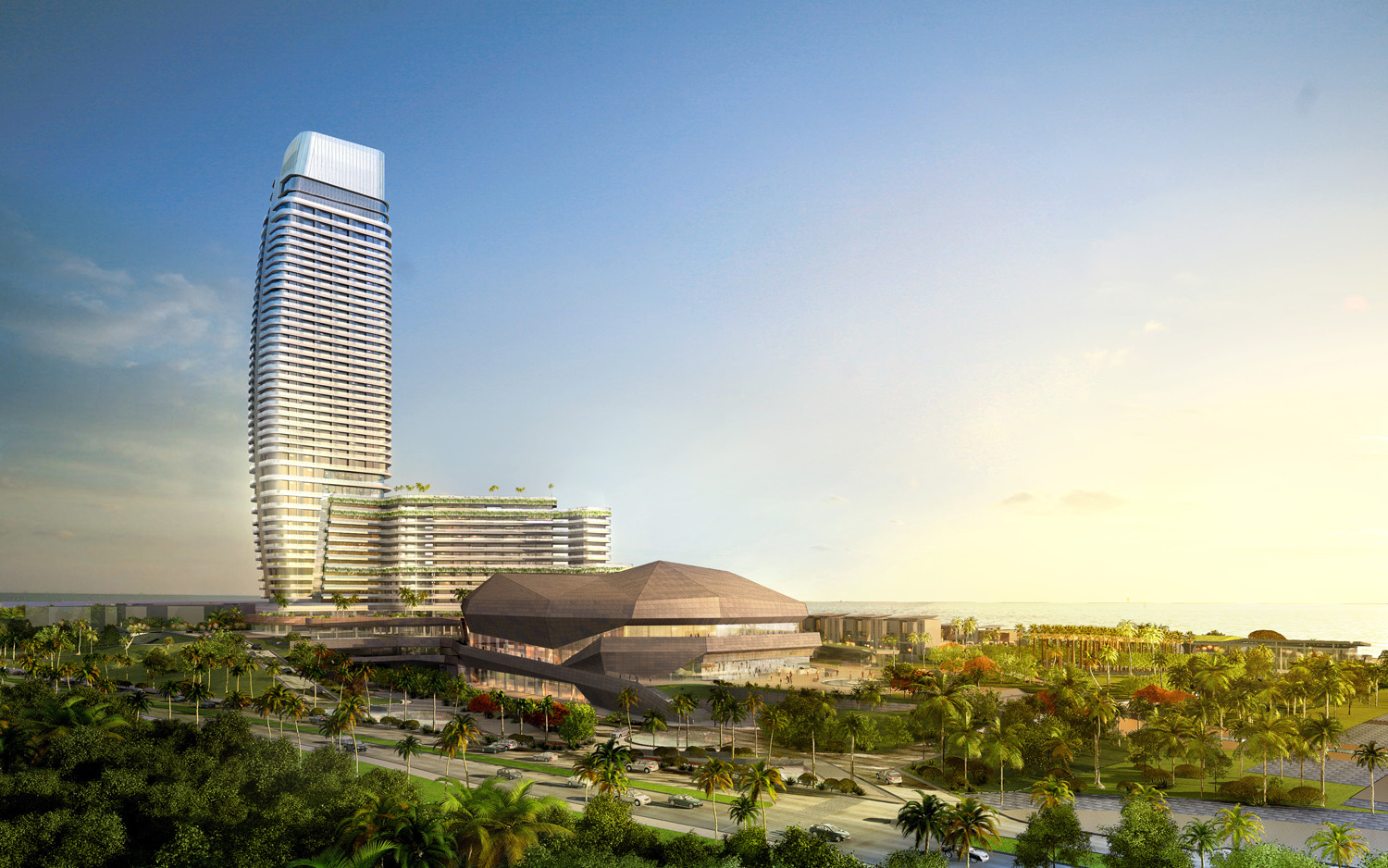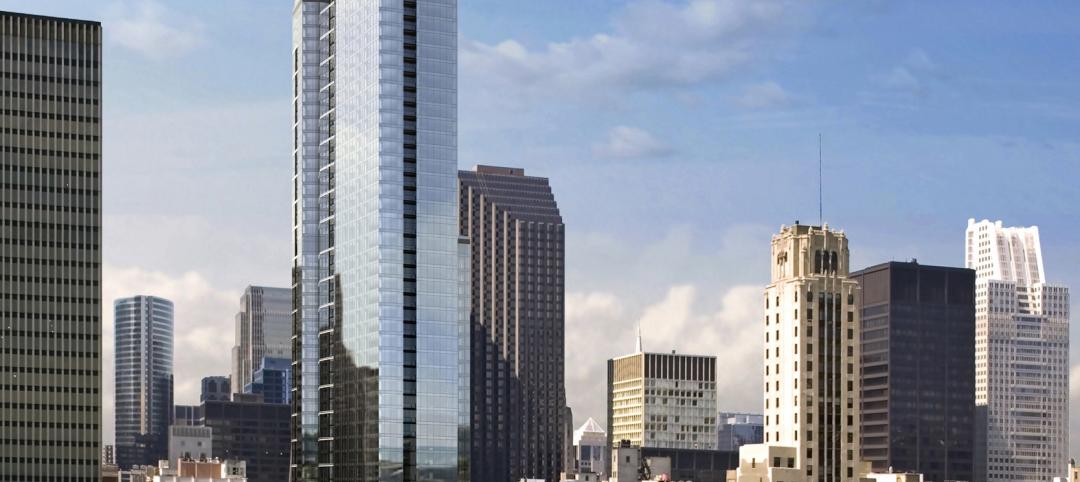Architecture firm Goettsch Partners has unveiled its design for a new resort and meeting destination on China’s Hainan Island in Haitang Bay.
Developed by Poly Real Estate Group, the complex, called Rosewood Sanya and International Finance Forum, features a 729-key resort hotel and serviced apartment tower, a 28,000-sm International Finance Forum convention center, a series of connecting retail buildings, and a modest visitors center.
Located at the southern end of the island in the city of Sanya, the complex focuses on two primary design elements: a lighthouse tower for the hotel and serviced apartments, and a rock form for the convention center.
To be operated by Rosewood Hotels & Resorts, the 45-story, 123,500-sm hotel and serviced apartment tower is distinctive as a resort property, standing as a clear landmark on the waterfront. The International Finance Forum is designed as a premier convention facility, catering to national and international economic and political summits, as well as a variety of other meetings and special events.
Rising from a conceptual outcropping of rock, the 233-meter-tall “lighthouse” hotel and serviced apartment tower will be an iconic symbol of Haitang Bay, with its glowing beacon visible as visitors approach from any direction.
Designed to be a unique resort in the sky, the building is organized vertically, with the arrival sequence, landscape, and incorporation of water and views all considered integral to the guest experience.
The resort is purposely designed to be intimate and exclusive, offering a limited number of rooms—all generously sized—as well as an extensive array of amenities. Hotel guests arrive at a lushly landscaped entry and are immediately whisked up elevators to the sky lobby on level 14 for check-in. This expansive two-story level features unparalleled views and landscaped terraces, along with several amenities, including a sweeping infinity-edge sky pool, lobby lounge, three-meal restaurant, and an executive club.
From the sky lobby, local elevators then escort guests to their rooms on the lower levels. All 229 guest rooms face east and feature ocean views. Each guestroom also includes its own individual terrace or, in some cases, its own plunge pool.
The 500 serviced apartments are positioned on the upper floors of the tower, as well as behind the hotel areas on the lower floors. The top of the tower provides a club amenity level for all apartment units. This multilevel space contains small gathering and larger meeting spaces, along with areas for drinks and entertainment.
The overall complex is scheduled for completion in 2015, with the hotel opening in 2017.
Related Stories
| Mar 2, 2011
How skyscrapers can save the city
Besides making cities more affordable and architecturally interesting, tall buildings are greener than sprawl, and they foster social capital and creativity. Yet some urban planners and preservationists seem to have a misplaced fear of heights that yields damaging restrictions on how tall a building can be. From New York to Paris to Mumbai, there’s a powerful case for building up, not out.
| Mar 1, 2011
Smart cities: getting greener and making money doing it
The Global Green Cities of the 21st Century conference in San Francisco is filled with mayors, architects, academics, consultants, and financial types all struggling to understand the process of building smarter, greener cities on a scale that's practically unimaginable—and make money doing it.
| Mar 1, 2011
How to make rentals more attractive as the American dream evolves, adapts
Roger K. Lewis, architect and professor emeritus of architecture at the University of Maryland, writes in the Washington Post about the rising market demand for rental housing and how Building Teams can make these properties a desirable choice for consumer, not just an economically prudent and necessary one.
| Mar 1, 2011
New survey shows shifts in hospital construction projects
America’s hospitals and health systems are focusing more on renovation or expansion than new construction, according to a new survey conducted by Health Facilities Management magazine and the American Society for Healthcare Engineering (ASHE). In fact, renovation or expansion accounted for 73% of construction projects at hospitals responding to the survey.
| Mar 1, 2011
AIA selects 6 communities for long-term sustainability program
The American Institute of Architects today announced it has selected 6 communities throughout the country to receive technical assistance under the Sustainable Design Assessment Team (SDAT) program in 2011. The communities selected are Shelburne, Vt., Apple Valley, Mn., Pikes Peak Region, Co., Southwest DeKalb County, Ga., Bastrop, Tx., and Santa Rosa, Ca. The SDAT program represents a significant institutional investment by the AIA in public service work to assist communities in developing policy frameworks and long term sustainability plans.
| Feb 24, 2011
Perkins+Will designs 100 LEED Certified buildings
Perkins+Will announced the Leadership in Energy and Environmental Design (LEED) certification of its 100th sustainable building, marking a key milestone for the firm and for the sustainable design industry. The Vancouver-based Dockside Green Phase Two Balance project marks the firm’s 100th LEED certified building and is tied for the highest scoring LEED building worldwide with its sister project, Dockside Green Phase One.
| Feb 24, 2011
New reports chart path to net-zero-energy commercial buildings
Two new reports from the Zero Energy Commercial Buildings Consortium (CBC) on achieving net-zero-energy use in commercial buildings say that high levels of energy efficiency are the first, largest, and most important step on the way to net-zero.
| Feb 24, 2011
Lending revives stalled projects
An influx of fresh capital into U.S. commercial real estate is bringing some long-stalled development projects back to life and launching new construction of apartments, office buildings and shopping centers, according to a Wall Street Journal article.
| Feb 23, 2011
London 2012: What Olympic Park looks like today
London 2012 released a series of aerial images that show progress at Olympic Park, including a completed roof on the stadium (where seats are already installed), tile work at the aquatic centre, and structural work complete on more than a quarter of residential projects at Olympic Village.
| Feb 23, 2011
Call for Entries: 2011 Building Team Awards, Deadline: March 25, 2011
The 14th Annual Building Team Awards recognizes newly built projects that exhibit architectural and construction excellence—and best exemplify the collaboration of the Building Team, including the owner, architect, engineer, and contractor.


